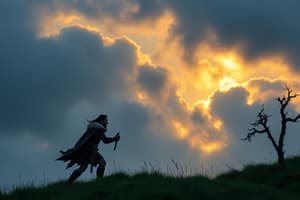Podcast
Questions and Answers
Which theme in Beowulf highlights the conflict between good and evil?
Which theme in Beowulf highlights the conflict between good and evil?
- Good vs. Evil (correct)
- Heroism
- The Importance of Reputation
- Fate and Destiny
The Old English period of literature is characterized by the use of written prose rather than oral traditions.
The Old English period of literature is characterized by the use of written prose rather than oral traditions.
False (B)
What does the character Beowulf represent in the story?
What does the character Beowulf represent in the story?
The archetypal hero who embodies strength, courage, and duty to his people.
Beowulf's desire for glory and lasting fame stems from the theme of __________.
Beowulf's desire for glory and lasting fame stems from the theme of __________.
Match the following characters from Beowulf with their corresponding representations:
Match the following characters from Beowulf with their corresponding representations:
Which literary movement is characterized by an emphasis on emotion and individualism?
Which literary movement is characterized by an emphasis on emotion and individualism?
Norse mythology has no influence on the character motivations in Beowulf.
Norse mythology has no influence on the character motivations in Beowulf.
What does the term 'wyrd' represent in Beowulf?
What does the term 'wyrd' represent in Beowulf?
Flashcards are hidden until you start studying
Study Notes
Themes In Beowulf
- Heroism: Central theme showcasing the qualities of bravery, loyalty, and honor.
- Good vs. Evil: The conflict between Beowulf and monstrous figures like Grendel, Grendel's mother, and the dragon.
- Fate and Destiny: Exploration of wyrd (fate) and its role in the lives of characters.
- The Importance of Reputation: Beowulf's desire for glory and lasting fame through his deeds.
- Strength and Weakness: Physical strength of heroes contrasted with their vulnerabilities.
Literary Movements
- Old English Period: Literature before 1100, characterized by oral tradition and epic poetry.
- Romanticism: Emphasis on emotion, nature, and individualism; reaction against Enlightenment rationalism.
- Modernism: Focus on new forms and techniques; often explores alienation and fragmentation of society.
- Postmodernism: Questioning of narratives and structures, incorporating irony and playfulness in literature.
Cultural Influences
- Anglo-Saxon Culture: Influence of Germanic tribes, emphasizing warrior ethics and tribal loyalty.
- Christianity: Integration of Christian elements in pre-Christian narratives and moral lessons.
- Norse Mythology: Elements of Norse beliefs in heroism and fate, impacting character motivations.
- Historical Context: Reflection of societal values and historical events of the Anglo-Saxon period.
Character Analysis
- Beowulf: The archetypal hero; embodies strength, courage, and a sense of duty to his people.
- Grendel: Represents chaos and evil; a creature alienated from society and driven by violence.
- Grendel's Mother: Symbolizes vengeance and the complexity of motherhood; challenges Beowulf.
- The Dragon: Represents the ultimate challenge; symbolizes greed and the inevitability of death.
- Wiglaf: Beowulf's loyal companion; represents loyalty and the future of heroism.
Language And Style
- Old English: Language characterized by its Germanic roots, using alliteration and kennings.
- Alliteration: Repetition of consonant sounds at the beginning of words for rhythm and emphasis.
- Kennings: Metaphorical compound expressions (e.g., "whale-road" for sea) that enrich imagery.
- Epic Poetry Structure: Use of a formal style, including elevated diction and a serious tone.
- Oral Tradition: The narrative is crafted for oral recitation, impacting rhythm and repetitive phrasing.
Themes In Beowulf
- Heroism: Highlights bravery, loyalty, and honor as essential qualities of a hero.
- Good vs. Evil: Central conflict depicted through Beowulf's battles with Grendel, Grendel's mother, and the dragon.
- Fate and Destiny: Concept of wyrd illustrates the influence of fate on characters’ lives and choices.
- Importance of Reputation: Beowulf seeks glory and enduring fame as a reflection of his heroic actions and legacy.
- Strength and Weakness: Contrasts physical prowess of heroes with their innate vulnerabilities and limitations.
Literary Movements
- Old English Period: Prevailing literature style before 1100, characterized by oral traditions and epic storytelling.
- Romanticism: Focus on emotion, nature, and individualism as a counter to Enlightenment rationality.
- Modernism: Emphasizes innovative forms and themes, often addressing social alienation and fragmentation.
- Postmodernism: Challenges traditional narratives and structures, marked by irony and playful elements.
Cultural Influences
- Anglo-Saxon Culture: Influenced by Germanic tribes; emphasizes warrior ethics, loyalty, and communal ties.
- Christianity: Blends Christian elements with pre-Christian narratives, offering moral insights.
- Norse Mythology: Incorporates themes of heroism and fate, affecting character motivations and actions.
- Historical Context: Reflects societal norms and events during the Anglo-Saxon era, informing the narrative.
Character Analysis
- Beowulf: The quintessential hero, showcasing tremendous strength, courage, and commitment to his people.
- Grendel: Embodiment of chaos and evil, showcasing societal alienation and violent tendencies.
- Grendel's Mother: Represents vengeance intertwined with motherhood, challenging Beowulf's heroism.
- The Dragon: Personifies the ultimate challenge that Beowulf faces, symbolizing greed and mortality.
- Wiglaf: Beowulf's devoted companion, symbolizing loyalty and the evolving notion of heroism in the narrative.
Language And Style
- Old English: Distinct language with Germanic influences, noted for its rhythmic qualities.
- Alliteration: Utilizes repetition of initial consonant sounds to create rhythm and enhance emphasis.
- Kennings: Creative compound expressions enhance imagery (e.g., "whale-road" for the sea).
- Epic Poetry Structure: Features formal diction, a serious tone, and elevated language suitable for epic storytelling.
- Oral Tradition: Designed for recitation, impacting rhythm and the use of repetitive phrasing to aid memorization.
Studying That Suits You
Use AI to generate personalized quizzes and flashcards to suit your learning preferences.




